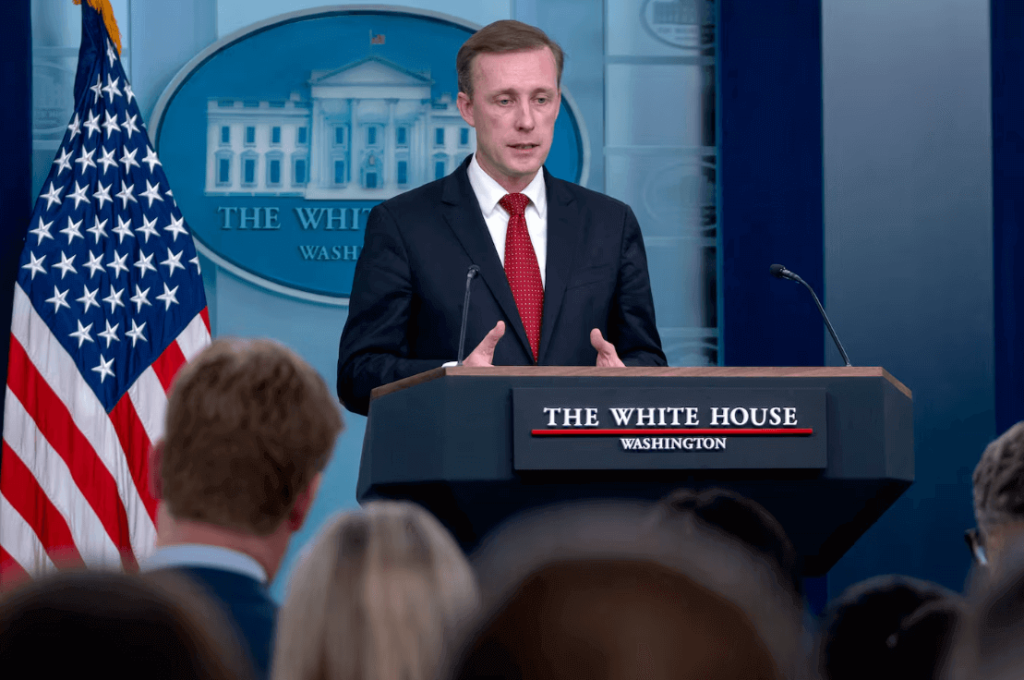【中美创新时报2024 年 10 月 24 日编译讯】(记者温友平编译)白宫指示五角大楼和情报机构增加对人工智能的采用,扩大拜登政府遏制来自中国和其他对手的技术竞争的努力。对此, 《华盛顿邮报》记者Gerrit De Vynck作了下述报道。
白宫指示五角大楼和情报机构增加对人工智能的采用,扩大拜登政府遏制来自中国和其他对手的技术竞争的努力。
该法令是周四发布的具有里程碑意义的国家安全备忘录的一部分。它旨在让政府机构加强人工智能的实验和部署。
根据白宫新闻稿,该备忘录还禁止机构以“不符合民主价值观”的方式使用该技术。
国家安全顾问杰克·沙利文 (Jake Sullivan) 在周四的演讲中表示:“这是我们国家有史以来第一个利用人工智能的力量和管理风险来推进国家安全的战略。”
沙利文称人工智能的变化速度“令人惊叹”,并表示它有可能影响从核物理到火箭和隐形技术等领域。
根据与高级政府官员的简报,白宫认为,提供使用人工智能的明确规则将使政府机构更容易使用该技术,这些官员在报告发布前不愿透露姓名,以讨论报告的细节。
“我们必须胜过我们的对手,”其中一位官员说。 “由于缺乏政策清晰度和法律清晰度,不能做什么和不能做什么,我们可能会看到更少的实验。”
国家安全备忘录称,政府机构不应使用人工智能来追踪美国人的言论自由或绕过现有的核武器管制。
然而,美国公民自由联盟周四表示,政府给予国家安全机构过多的自由裁量权,允许这些机构“自我监管”。
“尽管承认人工智能存在相当大的风险,但这项政策还远远不足以保护我们免受危险和不负责任的人工智能系统的侵害,”美国公民自由联盟国家安全项目副主任帕特里克·图米在一份声明中表示。“如果开发国家安全人工智能系统是国家的当务之急,那么采取关键的权利和隐私保护措施也同样紧迫。”
另一位高级政府官员表示,美国目前在人工智能方面“实力雄厚”,其公司在该领域占据主导地位。这位官员说,保持领先地位,避免来自包括中国在内的竞争对手的“战略意外”是政府的一项关键优先事项。
这份备忘录是拜登政府试图回应人们对人工智能潜在负面影响的担忧的最新例证,同时也鼓励政府使用该技术,并允许美国科技公司继续在该领域进行创新。
在过去两年中,自从 OpenAI 的 ChatGPT 引发了人们对人工智能的新兴趣和投资热潮以来,华盛顿的监管机构和政界人士一直在努力了解并开始监管企业和政府迅速采用的新型技术。
这份国家安全备忘录是对拜登总统去年签署的一项广泛的人工智能行政命令的回应。它呼吁政府研究如何促进人工智能创新,同时确保该技术不会伤害人类。
周四的备忘录指示政府帮助美国公司保护其人工智能技术不被外国间谍窃取,并继续致力于实现对尖端人工智能项目至关重要的高端计算机芯片供应链的多元化。目前,这些芯片大部分在台湾生产。
军事指挥官、拜登政府成员和国会政界人士都将人工智能视为美国必须与中国竞争的一个领域,以保持军事和经济主导地位。美国政府已禁止向中国出口某些对先进人工智能项目至关重要的计算机芯片。
军方长期以来一直是某些形式人工智能的早期采用者,例如处理卫星照片以识别潜在目标的图像识别算法和可以在复杂地形上自动飞行的巡航导弹。但军事分析人士表示,人工智能将在未来几年的军事竞争中发挥越来越重要的作用,尤其是在美国和中国争夺太平洋影响力的情况下。
情报分析人员仍在手动筛选来自卫星、人类间谍以及舰船和飞机上的传感器的大量数据,以拼凑出潜在军事威胁的图景。五角大楼内外的人工智能倡导者表示,该技术可以更快地综合这些信息,并为指挥官提供洞察力,使他们能够在战场上做出更好或更快的决策。
在广阔的太平洋,空中和远洋无人机上更复杂的人工智能可以让它们更独立地运作,让美国能够更有效地监视和控制该地区。
美国的出口管制可能会正式切断中国科技产业与最先进的人工智能计算机芯片的联系,但科技行业和军方领导人表示,中国并不落后于美国。
隐私和民权倡导者警告说,美国军方和情报机构用来对付对手的人工智能技术也可能被本国政府用来对付美国公民。
据《华盛顿邮报》最近的一项调查显示,美国各地的警察部门经常在调查中使用人脸识别技术,但很少披露此类活动。过去几年在五角大楼支持下开发的自主无人机和机器人技术现在也被执法机构使用。
根据白宫发言人提供的一份关于该文件的情况说明书,这份备忘录“明确指出”政府应该只以“符合民主价值观”的方式使用人工智能。根据情况说明书,备忘录还特别要求各机构监控人工智能系统在隐私、歧视和人权方面可能带来的风险。
宾夕法尼亚大学政治学教授迈克尔·霍洛维茨 (Michael Horowitz) 从 2022 年到今年早些时候一直在五角大楼负责人工智能政策,他说这项政策在加快人工智能采用的需要和安全问题之间取得了平衡。现在由政府来贯彻执行。
“实施对于确保现实与愿景的雄心相匹配至关重要,”霍洛维茨说。
本报告使用了美联社的材料。
题图:白宫国家安全顾问杰克·沙利文于 2024 年 10 月 1 日在华盛顿白宫的新闻发布会上发表讲话。(美联社照片/Mark Schiefelbein,文件)Mark Schiefelbein/美联社
附原英文报道:
White House orders Pentagon and intelligence agencies to increase use of AI
By Gerrit De Vynck The Washington Post,Updated October 24, 2024,
FILE – White House national security adviser Jake Sullivan speaks, Oct. 1, 2024, during a press briefing at the White House in Washington. (AP Photo/Mark Schiefelbein, File)Mark Schiefelbein/Associated Press
The White House is directing the Pentagon and intelligence agencies to increase their adoption of artificial intelligence, expanding the Biden administration’s efforts to curb technological competition from China and other adversaries.
The edict is part of a landmark national security memorandum published Thursday. It aims to make government agencies step up experiments and deployments of AI.
The memo also bans agencies from using the technology in ways that “do not align with democratic values,” according to a White House news release.
“This is our nation’s first-ever strategy for harnessing the power and managing the risks of AI to advance our national security,” national security adviser Jake Sullivan said in a speech Thursday.
Sullivan called the speed of change in AI “breathtaking” and said it had the potential to affect fields ranging from nuclear physics to rocketry and stealth technology.
The White House believes that providing clear rules for using AI will make it easier for government agencies to use the technology, according to a briefing with senior administration officials who spoke on the condition of anonymity to discuss details of the report before its publication.
“We must outcompete our adversaries,” said one of the officials. “With a lack of policy clarity and legal clarity of what can and can’t be done, we are likely to see less experimentation.”
Government agencies should not use AI to track Americans’ free speech or get around existing controls on nuclear weapons, the national security memo says.
Yet, the American Civil Liberties Union said Thursday the government was giving too much discretion to national security agencies, which would be allowed to “police themselves.”
“Despite acknowledging the considerable risks of AI, this policy does not go nearly far enough to protect us from dangerous and unaccountable AI systems,” Patrick Toomey, deputy director of ACLU’s National Security Project, said in a statement. “If developing national security AI systems is an urgent priority for the country, then adopting critical rights and privacy safeguards is just as urgent.”
The United States currently has a “strong hand” in AI and its companies dominate the field, another of the senior administration officials said. Maintaining that lead to avoid a “strategic surprise” from rivals including China is a key government priority, the official said.
The memo is the latest example of the Biden administration trying to respond to concerns about the potential downsides of AI while also encouraging government use of the technology and allowing tech companies in the United States to keep innovating in the field.
Over the past two years, since OpenAI’s ChatGPT sparked a boom of new interest and investment in AI, regulators and politicians in Washington have scrambled to understand and begin regulating new forms of the technology rapidly being adopted by businesses and governments.
The national security memo was written in response to an expansive executive order on AI signed by President Biden last year. It called for the government to study how to foster AI innovation while also making sure the technology didn’t harm people.
Thursday’s memo directs the government to help US companies defend their AI technology from being stolen by foreign spies and to continue working on diversifying the supply chain for high-end computer chips crucial to cutting-edge AI projects. Most of those chips are currently produced in Taiwan.
Military commanders, members of the Biden administration, and politicians in Congress have framed AI as an area in which the United States must compete with China if it is to maintain military and economic dominance. The US government has banned the export to the country of certain computer chips that are key to advanced AI programs.
The military has long been an early adopter of some forms of AI, such as image-recognition algorithms that process satellite photos to identify potential targets and cruise missiles that can fly themselves over complex terrain. But military analysts say AI will play an increasingly central role in military competition in the years to come, especially as the US and China vie for influence in the Pacific.
Intelligence analysts still manually sift through huge volumes of data from satellites, human spies, and sensors on ships and planes to piece together a picture of potential military threats. AI advocates both outside and within the Pentagon say the technology could synthesize that information much faster and give commanders insights that enable better or quicker decisions on the battlefield.
In the vast Pacific, more sophisticated AI on airborne and oceangoing drones could let them operate more independently, allowing the United States to monitor and control the region more effectively.
China’s tech industry may be officially cut off from the most advanced AI computer chips by US export controls, but tech industry and military leaders say the country isn’t far behind the United States.
Privacy and civil rights advocates have warned that the same AI technology the US military and intelligence establishment use against their adversaries could also be turned against American citizens by their own government.
Police departments across the United States routinely use face recognition technology in investigations, while seldom disclosing such activity, according to a recent Washington Post investigation. Autonomous drone and robot technology developed in past years with support from the Pentagon is now also used by law enforcement agencies.
The memo “unequivocally states” that the government should use AI only in ways that “align with democratic values,” according to a fact sheet about the document provided by a White House spokesperson. The memo also specifically requires agencies to monitor the risk AI systems can pose when it comes to privacy, discrimination and human rights, according to the fact sheet.
Michael Horowitz, a political science professor at the University of Pennsylvania who worked at the Pentagon on AI policy from 2022 until earlier this year, said the policy balances the need to speed up AI adoption with safety concerns. Now it’s up to the government to follow through.
“Implementation will be critical to ensure the reality on the ground matches the ambition of the vision,” Horowitz said.
Material from the Associated Press was used in this report.

